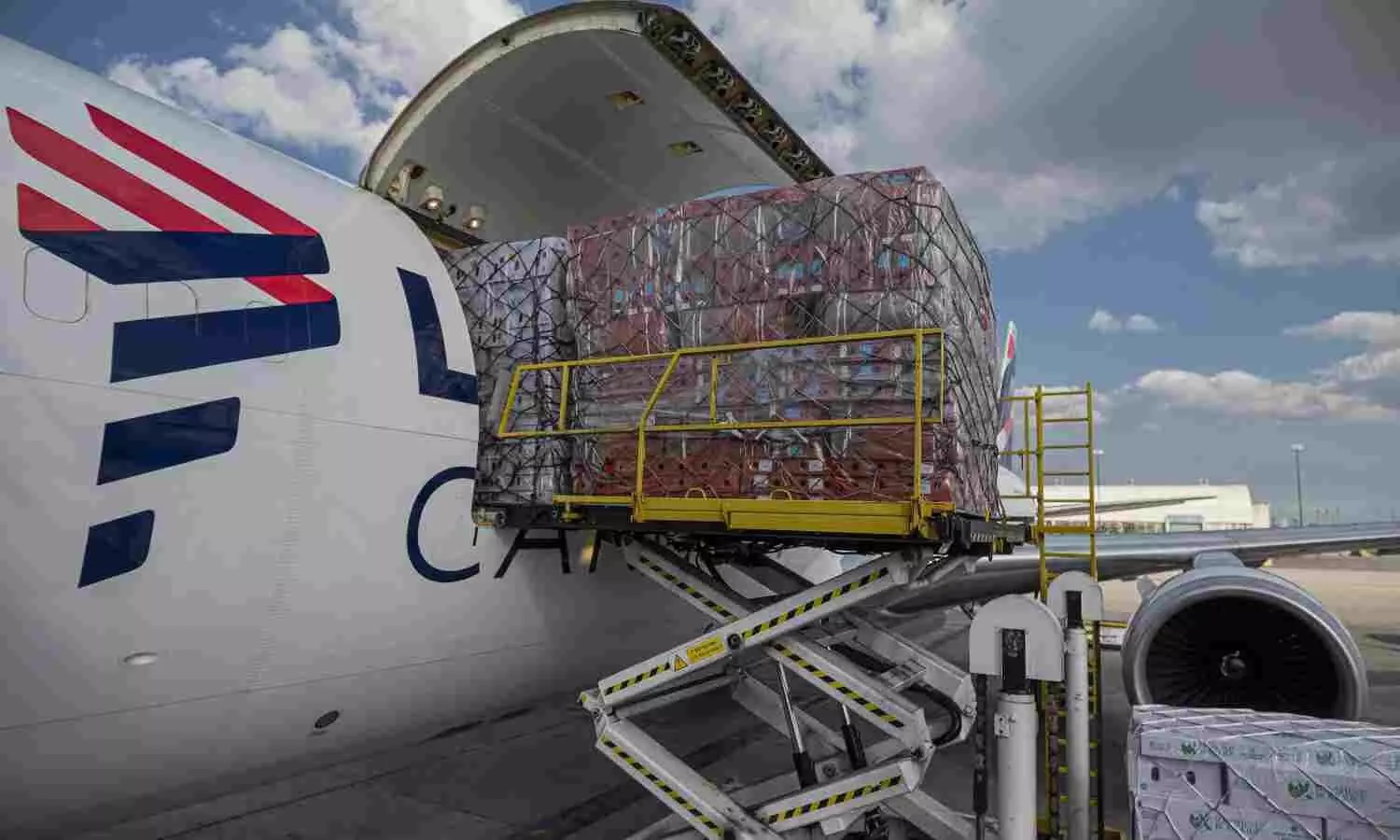
'The next half of 2022 will be filled with uncertainty'
Andres Bianchi, the Chief Executive Officer of LATAM Cargo discussed the fuel price increase, cargo plans with the new freighters, concerns about lithium battery safety, sustainability, and other topics in this interview.

LATAM Cargo is a commercial arm of LATAM Airlines that specialises in cargo transportation. The region's largest airline group operates in five domestic markets: Brazil, Chile, Colombia, Ecuador, and Peru, as well as international flights from Latin America to Europe, Oceania, the United States, and the Caribbean. The Group's aircraft fleet includes Boeing 767, 777, and 787s, as well as Airbus A350, A321, A320, A320neo, and A319s, with additional freighters expected this year and in 2023.
Recently, LATAM has made headlines for receiving new freighters, expanding cargo service, and collaborating with industry experts on sustainability.
Zinal Dedhia of The STAT Trade Times spoke with Andres Bianchi, the Chief Executive Officer of LATAM Cargo. He is a veteran in the aviation business, having served LATAM Cargo for over 12 years. Bianchi discussed the fuel price increase, cargo plans with the new freighters, concerns about lithium battery safety, sustainability, and other topics in this interview.
In July, LATAM Cargo announced a significant expansion of its transatlantic freighter business, nearly doubling capacity between European and U.S.A destinations, as well as improved connection to Central and South America through New York and Miami. Could you elaborate on your cargo plans and when do you expect to begin the service?
This is part of a larger expansion plan that we revealed in 2021 when we indicated we would raise our freighter fleet from 11 to anything in between 20 and 22 aircraft by the end of 2023. The aim behind the transatlantic expansion is to give more service options to our clients in Europe, including both US stops and using the Miami hub to deliver new destinations in South and Central America.
LATAM acquired their most recent Boeing 767 freighter conversion in May. What will be the primary purpose of this freighter?
We acquired three freighters between December and May, and we will receive two more in September and December, as well as six more aircraft in 2023. Each aircraft is essentially a building block in our strategy to grow. The last freighter that we got enabled us to increase our capacity between North America, and South America, particularly reinforcing our position in the flower markets of South America. It also enables us to start launching some of the freighter services between Europe and North America and then down connecting to South America.
When we talk about northbound cargo products, it's primarily flowers and salmon, and we are increasing our capacity by combining freighters and recovering the belly operation out of South America. Now, on the southbound, we transport mainly electronics, mining equipment, pharmaceuticals, and consumer goods.
In the first quarter of 2022, LATAM Cargo generated 430.7 million dollars in sales, a 63.5 % increase over the first quarter of 2019. Who do you believe should be credited for this success? How did you achieve this?
This result shows a tremendous effort by the team to maintain capacity in the face of almost all belly capacity in 2019. Prior to Covid, about half of our lift came from long haul belly capacity. To do this, we increased the usage of the cargo fleet while also adding extra planes, and running passenger freighters. On the other hand, you also benefited from an improved freight rate which is consistent with what has happened globally. But what's ultimately driven this result is our team's focus on providing valuable solutions to our clients during a very difficult period.
Andres Bianchi, the Chief Executive Officer of LATAM Cargo
What are your expectations for the next half of 2022?
The next half of 2022 will be filled with uncertainty. Globally, there are many moving parts, both in terms of consumer demand and production challenges. In particular, in South America, there is a lot of political and economic uncertainty making forecasts even more difficult to make.
Our primary goal is to continue to provide the finest solutions to our customers' demands while remaining highly adaptable and nimble in terms of adjusting the network. At the same time, we are leveraging two areas in which we have invested heavily over the previous four years. First, create a better customer experience by providing our products in a more convenient and efficient manner. We are also capitalising on the cost efficiencies that we have by improving productivity.
We believe we are well prepared for the second half of the year even if conditions shift from a traditional peak to a more bearish situation in terms of demand.
What are the most significant challenges confronting cargo operators today?
First, the level of uncertainty that we face. We are coming off a time in which demand exceeded supply, and it is unclear whether this will happen in the second half of this year or in 2023. The second significant challenge is staffing or service difficulties at key destinations. This has occurred in different locations since 2021 and it is becoming more evident as passenger operations recover. The third element is fuel price increases which put certain parts of our network under pressure. To address these challenges, we will need to adapt and navigate in order to present better choices to your customers. We believe flexibility will be the key in the next 2-3 years.
Fuel prices have been volatile in recent months as a result of geopolitical events and airspace closures. How is this affecting global demand, and how are things likely to change?
The combination of higher inflation and monetary policy changes is clearly impacting consumption and investor decisions. Therefore I believe there will be an impact on demand, but how large that impact will be is something we are all trying to model. In our case, we are focusing on scenarios and attempting to figure out what we would do anyhow and what would provide us additional options later on.
How are you addressing the issue of staff shortages? What fueled this shortage? Are you expecting any impact from your capacity growth plans?
Staffing shortages hit us the hardest in 2021 because our core facilities are that we operate by ourselves, in countries where this has already occurred, namely the United States and South America. Recovering the staffing levels is challenging because due to training and security requirements there is a rather long lag between hiring someone and that person becoming active. Therefore it is critical to complement the hiring process with improving your value proposition to improve retention.
A recent incident occurred when a flight was compelled to make an emergency landing owing to a fire started in cargo caused by lithium batteries. Do you believe the government should introduce new safety requirements for the transportation of flammable lithium batteries? How concerned are you about the safety of lithium transport?
This is a crucial issue, and we at LATAM Cargo take it very seriously. We have some of the most stringent criteria for lithium battery transportation, and we will always maintain them at the highest possible level. There is no simple explanation for why this occurs. I feel that a three-pronged strategy will make more sense, and this is because when you look at why this happens, there are three major origins of the problem.
One, there are people who are unaware that the safety of lithium batteries is a concern and hence do not take the required precautions to avoid something from happening. To overcome this, you must create awareness. Two, then there are some who are aware of the dangers and are prepared to go to any length to avoid them. However, anything may fall through the cracks at times, which is a concern. In this instance, you should strengthen procedures and maybe add certain safety and additional safety standards, such as cargo scanning.
Then the third type is people who know lithium batteries are dangerous but refuse to comply with safety requirements. In this case, governments must be very active and deliberate in prosecuting people who are doing this because the consequences of what they are doing are quite significant. So, I believe it is more prudent to take a wide view of the situation and focus on these three specific levers in order to handle this very significant problem.
There is a strong emphasis on achieving sustainability. LATAM has offered an offset programme called 'Let's Fly Neutral' for air freight transportation, to make an important commitment to the partners. Can you please explain how this programme helps to reduce carbon emissions? Senator recently joined hands with LATAM, do you expect more such partnerships?
CO2 is a highly complicated problem and there is no single way that will enable us to meet our CO2 reduction targets. For example, even if we concentrate on sustainable aviation fuels and look at the best available solutions in terms of fuel burn reduction, we as an industry are still falling short of the effect we need to make. As a result, it makes sense to consider a combination of actions and incorporate them into a programme.
In our case, we are always striving to reduce and improve our fuel use but at the same time, we created 'Let's Fly Neutral', a solution based on offsets. We are concentrating on high-quality offsets that have an immediate impact. How does it work? Basically, our offsets are focused on preservation. Unfortunately, a substantial number of trees are cut down each year, resulting in a loss of CO2 absorption capacity. The goal of this initiative is to conserve such trees, which will have a short-term benefit since those trees will be up and contributing to the reduction of CO2 emissions.
From that standpoint, it's a programme that we have opened to a number of clients. Senator International has joined in, and we had a seasonal Mother's Day programme with Kuehne + Nagel, and we are also working with MOWI Chile, one of the largest salmon producers in the world.
The objective is to use a multi-pronged strategy to handle the problem in the most effective way possible.
Digitalisation and modern technologies are now in demand. You signed a deal with cargo.one in December 2021; how has the collaboration been so far? What are your digitalization plans for 2022 and 2023?
Digitalization is essential to our value proposition. It's a win-win situation since it makes you a better supplier while also making your firm more efficient. This is why, at the core of our strategy, is an agreement we signed to convert all of our IT platforms into a single input system called CROAMIS.
The fact that we are nearing completion of the deployment of CROAMIS, enables us to do a lot more on a digital side. One example is the agreements we have with WebCargo and cargo.one. Now, our ability to participate in marketplaces adds one more way for customers to interact with us. This is aligned with the objective to provide them with more choices: direct host to host connections, marketplaces, and an upgraded internet portal. The idea is to leverage digital to make our customer's experience easier, quicker, and more convenient.

